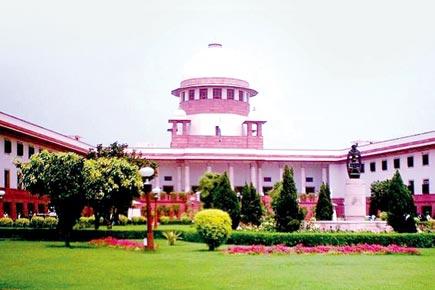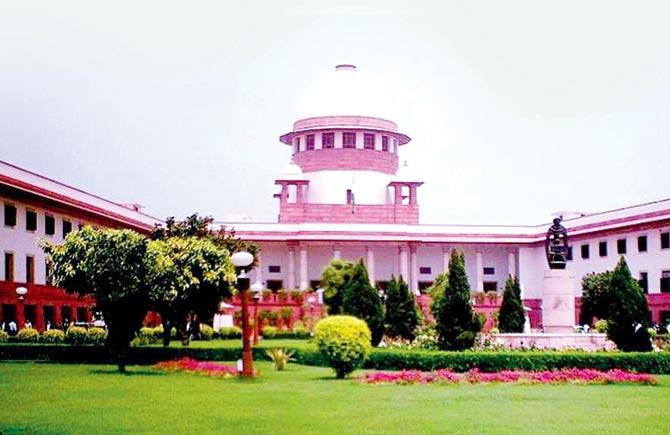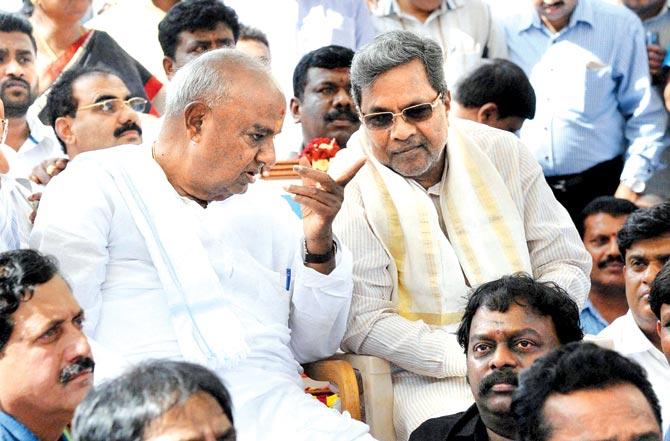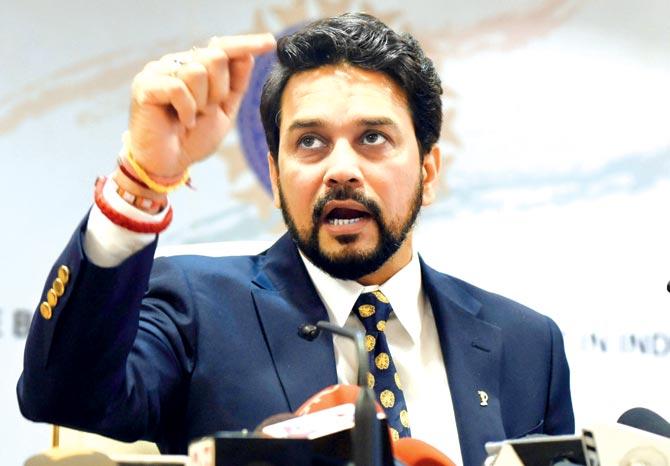The defying of the Supreme Court's judgements by various bodies in recent times is evidence of an impending constitutional crisis


Supreme Court
The Supreme Court of India is not called one of the most powerful apex courts in the world for nothing. It has been given wide jurisdiction over all kinds of cases. Over the years, it has expanded its jurisdiction even further, giving itself the power to strike down even amendments to the Constitution. None of this means anything if it can't enforce its orders. The open defiance of the BCCI and the Government of Karnataka is a challenge to the credibility of the Court.
ADVERTISEMENT
It's not uncommon for the parties, even in regular cases, to try and avoid complying with court orders. The hundreds of contempt petitions filed every year are testament to the fact that sometimes parties are not keen on following court orders.

Karnataka Chief Minister Siddaramaiah meets JD(S) Supremo HD Devegowda during a protest regarding the Cauvery issue in Bengaluru on Saturday. Pic/PTI
The court has many ways of ensuring compliance with its orders. In most cases, the threat of being imprisoned for defying court orders usually does the job. In other cases, the court depends on the police and other governmental authorities to make sure orders are followed.
When the government is in non-compliance, the threat of summoning the Chief Secretary of the department concerned usually has the intended effect. The BCCI's defiance — till Saturday it had indicated that it would defy the SC-constituted Lodha panel recommendations on the functioning of cricket bodies in the country — while it may make headlines and cause concern, is probably easier to resolve.

On Saturday, the BCCI again rejected three key recommendations of the Lodha Committee. BCCI president Anurag Thakur said all members attended the meeting barring Vidarbha Cricket Association, which became the first full member of the BCCI to adopt the recommendations by the SC appointed committee
The Court could summon the top officials of the BCCI and demand a personal explanation from them as to why they did not comply. If the Court isn't satisfied with their explanation, it could remind them of what happened to Subrata Roy Sahara when he couldn't properly explain why the Court's orders weren't being followed. If a short spell in prison doesn't convince them to change their minds, the court could, by judicial fiat, replace the management with a committee or an administrator. Once it realises that the Supreme Court is not taking things lightly, the BCCI's defiance may be short lived.
Karnataka's defiance, on the other hand, presents a very different kind of challenge. It's nothing short of a constitutional crisis. Two orders to release water to Tamil Nadu have been disobeyed and, by all accounts, a third is going to be disobeyed. In the two hearings so far, the Court had many options to enforce its order but it has chosen to do nothing. As Karnataka was the one who approached the Supreme Court, as it had a problem with implementing the Cauvery Water Disputes Tribunal award of 2007, the Court could just dismiss Karnataka's appeal and make the Tribunal's award final. This, though, would be a reflection of the Court's pique rather than an institutional measure.
It could order the Karnataka Chief Minister to appear in Court and give a personal explanation for the defiance. It could even threaten to send him to jail till he complied with the Court's orders. He wouldn't even be first Chief Minister to have faced this. Kalyan Singh was given a token imprisonment for a day by the Supreme Court for failing to abide by his commitment to preserve Babri Masjid from kar sevaks. This may also prove to be ineffective here as the defiance is not just a personal decision of the Chief Minister, but one which the government has taken as a constitutional authority.
The Supreme Court could direct the Central Government to take control of the dams and release water in accordance with its orders. This too would not be without precedent. In the dispute between Punjab and Haryana over the Sutlej Yamuna Link canal, the Supreme Court ordered the Union Government to take over the canal lands and have the work completed in accordance with the Court's orders and further to the treaties Punjab had entered into with Haryana and Rajasthan.
Twelve years after the judgment was passed, it has remained only on paper. Punjab passed a law repudiating the treaties over water sharing, and the President referred the law to the Supreme Court for its opinion. Twelve years later, the Supreme Court has yet to finally decide the reference by the President. The Union Government showed less than complete enthusiasm in helping enforce the will of the Court, and the Court itself has lost focus in ensuring compliance with the judgement. A sorry state of affairs that bodes ill for the current situation.
There are no easy options before the Supreme Court. Controlling neither "the purse nor the sword", it's the weakest of the three wings of the State. Part of this crisis of credibility has been self made. Its orders on the Cauvery dispute have been ill thought out and don't seem to suggest that the Court is fully aware of what it is doing. In each order, vastly different amounts of water are being directed to be released, in the wrong units, and with little reasoning. This is still an interim stage in the hearings but one gets the sense that the court has rushed in where others would've feared to tread.
Caught between the rock of residents' needs and the hard place of an unyielding Tamil Nadu Government, backed by a court order, the Karnataka government has chosen to fight the court. This fight is not just between the Court and the Karnataka government. It's a constitutional crisis that requires careful handling and tactful resolution. India's institutions show their credibility and robustness not when things are going well but when a moment of crisis, such as this comes up.
Matters may have begun with Karnataka facing a distress year in rains. But it's up to the Court and the governments to find a way out that preserves the credibility of the institutions without which government or rule of law would be impossible. Alok Prasanna Kumar is an advocate and also Visiting Fellow at the Vidhi Centre for Legal Policy. Views expressed here are purely personal
 Subscribe today by clicking the link and stay updated with the latest news!" Click here!
Subscribe today by clicking the link and stay updated with the latest news!" Click here!







